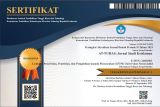Implementasi Gelar Adat dalam Perkawinan Masyarakat Lampung Perspektif Sosiologi dan Antropologi
(1) * Huzaini Husin
 (IAI Agus Salim Metro Lampung, Metro)
(IAI Agus Salim Metro Lampung, Metro) Indonesia
(*) Corresponding Author
AbstractThe marriage procession basically aims as the legality of a bond to build a household. However, this procession is of course carried out in accordance with the customs of the local community. This can be seen from the traditional wedding procession of the people of Lampung where each stage is carried out with traditional activities. In the case of this customary procession, there is something very interesting to study, namely the activity of granting traditional titles. This study aims to determine the procedure for conferring customary titles, the meaning of conferring customary titles and the function of conferring customary titles. This study uses a qualitative approach with a sociological and anthropological approach. Data collection techniques in this study consisted of in-depth interviews, documentation, and observation. The results of the study found that the procedure for granting an Indigenous Title had stages because each of these stages had a title and sacred value. The meaning of giving an adat title to the people of Lampung is where a person has obtained a position in a cradle, gets a clear status in adat so that it is organized in regulating adat and is structured so that it will take place in an orderly manner. The function of giving adat is as a difference in status, whether it is the status given by the family for generations in maintaining social status.
|
Keywords
Degree in Customs, Community Marriage, Sociology and Anthropology
Full Text: PDF
Refbacks
- There are currently no refbacks.
Copyright (c) 2022 Huzaini Husin
This journal is licensed under a
Creative Commons Attribution-ShareAlike 4.0 International License





.png)






